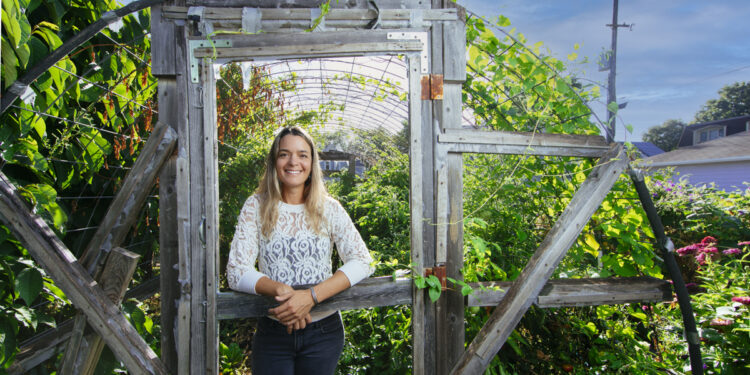While getting her B.S. in psychology at Concordia University in Seward, Nebraska, Sarah Smith spent a semester abroad in India.
br
“I think that was probably the moment that my eyes opened to the cultural relevance of food and honoring the food of different cultures and…what food means to families.”
br
After graduating from Concordia, she took a job at Boys Town, and later worked as an assistant teacher at a residential group home school in St. Louis.
br
It was a small economic downturn in 2005, however, that precipitated the 2007-2008 financial crisis and started her lifelong journey in the food industry.
br
Smith, who now works for the Nebraska Department of Education, was living in Detroit when the downturn hit. She had gotten an internship at GTN Studios that turned into a full-time job.
br
“Things were falling apart,” she said of that time. “And I thought, ‘man, I don’t know what I would do if I needed to feed myself in the future.’
br
“That’s kind of when I just decided I didn’t want to be working on car commercials in Detroit in dark rooms on beautiful days,” she said.
br
As her friends lost their jobs during that fourth-quarter slowdown in 2005, she pondered what she would do if she ever needed food. At the time, she said, she didn’t know how to grow “a single thing.”
br
“Something about food sparked interest for me, even though it wasn’t my background,” Smith said. “Little by little, I started becoming involved in working on organic farms, and I managed a farmer’s market in the Detroit area as an AmeriCorps member.” She also worked at a native landscaping company and a brewery, and in 2009, she and her now-ex-husband moved to Wyoming to raise Scottish Highland cows, doing direct-to-consumer beef sales.
br
“He is fifth generation on his family’s land out in Wyoming,” Smith said. “So it seemed like if we wanted to try to run the cattle business...that was the time to do it.”
br
They decided to get Scottish Highland cows after researching different types of heritage and grass-fed breeds that would do well in the rough landscape of the state. “They’re so beautiful,” Smith said. “They’re great cows.”
br
In 2013, Smith started working at the Center for Rural Affairs, a nonprofit organization in Alliance, Nebraska, that works to establish strong rural communities, social and economic justice, environmental stewardship, and opportunity. In 2017, she started her job with the state Department of Education, where she is currently the farm to school specialist. Her job includes working with the nonprofit National Farm to School Network.
br
It’s a role she takes seriously. Earlier this year, Smith testified on behalf of the education department in support of legislative bill 396, calling for a statewide farm to school program. The bill passed in May.
br
“We really look at the three different arms of farm to school,” she said. “[It’s] about local procurement and educational practices; experiential education; and hands-on school gardens. And so all of those things can improve children’s academic…well-being and their nutrition.” She added that it can also produce habits that will carry over into their adult lives and the lives of their families.
br
In her role, Smith works with many agricultural organizations, including University of Nebraska Extension, the Center For Rural Affairs, Buy Fresh Buy Local Nebraska, and The Big Garden, among others.
br
One organization she enjoys working with is No More Empty Pots. “They do a lot of work in the community on food security issues,” she said. “But it’s not just like a food pantry model. They’re doing all kinds of creative [outreach].”
br
NMEP is currently in a partnership with the Department of Education, working with Smith to further develop the Farm to School Producer Training program over the next two years.
br
Nancy Williams, president and CEO of NMEP, stated via email that the organization is “providing matching funding for producer stipends during the trainings.” They are prioritizing the recruitment of Black, Indigenous, and people of color producers to prepare their businesses for institutional sales.
br
Williams said she has worked with Smith on committees and in meetings. She described Smith as professional and “insightful in her comments.”
br
“She is thoughtful about inclusion, diversity, and equity,” Williams added. “Her actions align with her words and intention.”
br
Smith said she would like everyone to experience the spark NMEP can inspire. “I think about people in my own community or neighborhood that maybe don’t know how delicious these local foods can be,” she said. “I don’t know that everyone values whole, local, fresh foods for the benefits they can have to our mind and our body.”
br
That mind-body connection is especially important for students.
br
“It [is] reverberated over and over and over again, ‘food is medicine,’” Smith said. “It can be so healing to have good food. It can change behavior.”
br
Access to food, or the lack of, can also change the way children’s brains work in an academic setting. “It just makes me so sad that it’s not available [for all],” she added. “The miles that our food travels [are] important. Being able to grow more food in our state, in our cities, gives us security.”
br
Fortunately for Nebraskans, Smith and others are working to make that availability an actuality.
br
Visit education.ne.gov or farmtoschool.org for more information.











